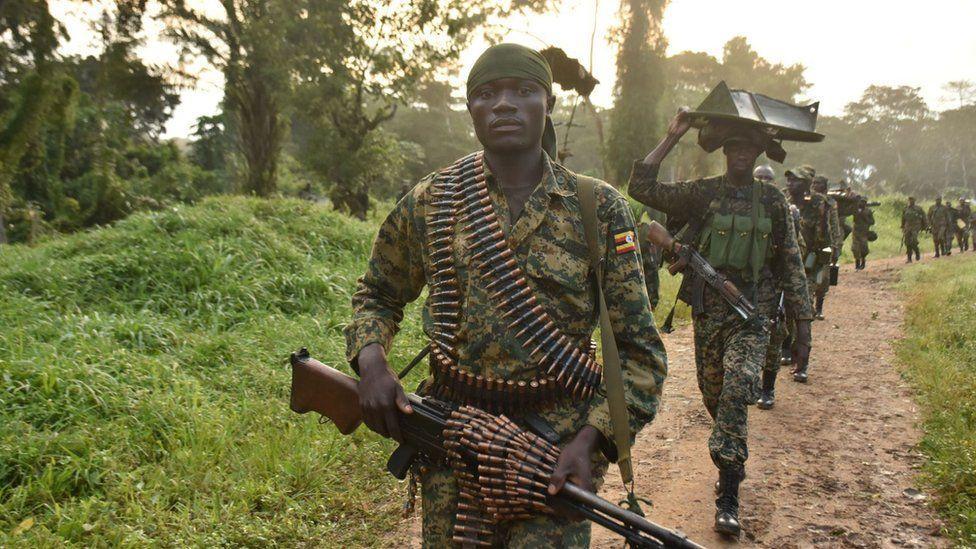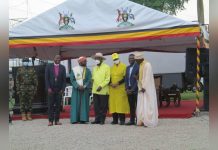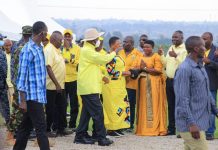Faridah N Kulumba
Africa-Press – Uganda. People’s Defence Forces (UPDF) have stepped up their deployment along the border between Uganda and DR Congo.
Uganda blamed the ADF for a triple suicide bombing in its capital Kampala in November. 16, which killed seven people, including the bombers.
Rebel violence in eastern DR Congo has largely been sustained by a lack of strong government institutions and mistrust in military intervention.
These are ideal conditions in which IS can expand, as evidenced by its surge across Iraq and Syria in 2014, and more recently in West Africa, where it has spread beyond north-east Nigeria into the Sahel region.
Similarly, IS expansion is often driven by alliances or the co-opting of established local groups with a shared ideology, as appears to have happened with the ADF.
According to the UN’s refugee agency, the UNHCR, the ADF has killed about 200 civilians and displaced nearly 40,000 others in Beni since January 2021. The rebel group also targets government and UN troops.
Since the emergence of IS in DR Congo, the frequency of attacks has increased.
How Ugandan Army Forces Killed Islamist-Linked Rebel Group Commander in DRC
The Uganda People’s Defence Forces Last week killed one of the commanders of an Islamic State (IS)-allied rebel group in the Democratic Republic of Congo that hosts hundreds of Ugandan troops that were deployed under a separate bilateral arrangement to help hunt down the IS group.
In November 2021, Uganda and DR Congo launched a joint operation against the Allied Democratic Forces (ADF), an armed group allied with Islamic State. The ADF has been based in the jungles of eastern Congo for more than two decades from where they launch attacks both within Congo and sometimes across the border in Uganda.
According to the military statement that was issued on Friday, the militia commander who was identified by only one name, Fazul, was a Tanzanian national who had been operating mostly in Mwalika valley in eastern Congo’s North Kivu province.
In June this year, the ADF rebels linked to ISIS attacked Uganda and killed 41 people, including 37 students who were burned, shot, or hacked to death with machetes in a sickening attack on Mpondwe-Lhubiriha School in Kasese District, about 1.2 miles from the DRC border.
An unknown number of people were abducted by the rebels, who fled across the porous border into Congo after the raid.
The unfortunate incident happened when the ADF rebels attacked the school, forced themselves into the student’s dormitories and started shooting and hacking others with machetes.
After thinking that all the students were dead, they set the dormitories on fire and those who were still alive suffered fatal burns. They also looted food before fleeing.
ADF group
ADF, which was originally a Uganda-based rebel group, launched its attacks in the 1990s in the west by a Ugandan Jamil Mukulu whose adherents were Ugandans disgruntled with the government’s treatment of Muslims.
Mukulu, together with some Ugandan Muslims, said they were sidelined by the President of Uganda Yoweri Kaguta Museveni’s policies.
The rebel group was soon routed by the Ugandan military which drove its fighters across the border into Congo where they have been based and where its fighters had been attacking villages and torching schools in the early 2000s.
The remnants fled across the border, to the east of the Democratic Republic of Congo. Mukulu founded the ADF with the intention of returning to Uganda to establish an Islamic government.
In 2015 Mukulu was arrested in Tanzania, which neighbors both DR Congo and Uganda, and was extradited to Uganda where he is on trial. After his arrest, the ADF transformed into a group with a more global outlook when Musa Baluku, a Ugandan in his mid-40s, inherited the leadership.
According to a report from the George Washington University’s Program on Extremism Baluku wanted to position the ADF as part of a broader global movement.
Initially, ADF rebels worked with local communities to set up businesses, which made them popular with many around the town of Beni, according to a 2011 UN report.
But that changed when they started attacking local Christian communities.
Crackdown
In June 2023 after the Kases attack, President Museveni said that the ADF is one of the fiercest rebels that have become desperate and cowardly to pressure exerted by both the UPDF and DR Congo national army following a joint operation launched under Operation dubbed ‘Shuja’ which means hero in Swahili.
The joint forces conducted search operations in the air and artillery strikes against suspected ADF bases in the forests of eastern Congo. Uganda said that its troops were sent into the eastern DR Congo to stay as long as needed to defeat Islamist militants.
The joint forces continue to pursue these terrorists from all corners of the jungles Uganda’s military said in the statement, adding that ADF fighters who are willing to surrender will be given amnesty.
For More News And Analysis About Uganda Follow Africa-Press






